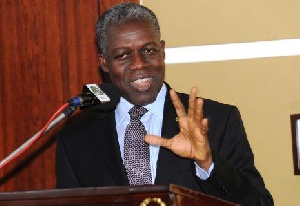Vice President Kwesi Amissah-Arthur, has encouraged Ghanaians, especially those in public administration, to develop the culture of writing their memoirs for posterity.
He also said the authentic telling of our stories must be done by ourselves and not outsiders.
Vice President Amissah-Arthur made the statement when he launched a book entitled: “Ghana Armed Forces in Lebanon and Liberia Peace Operations,” at the Kofi Annan International Peace-Keeping Training Centre (KAIPTC) at Teshie.
The 400-page book which was authored by Colonel (Dr) Emmanuel Wekem Kotia with the foreword by Dr Mohamed Ibn Chambas, provides insight into Ghana’s contributions to peace-keeping globally, and regional peace operations, especially in Lebanon and Liberia.
The colourful launch was well attended by serving senior Military officers, as well as those retired and diplomats.
Vice President Amissah-Arthur also observed that it was such a great idea to encourage people to write since any writing was better than no writing at all.
He said it was better that our national legacy was written in text rather than in transient word.
He commended the author of the book for his in-depth look at the task, experiences and challenges of Ghana’s peace-keeping contributions to the United Nations.
Vice President Amissah-Arthur stated that the international community must not be indifferent to conflicts no matter the trigger, and find solutions to them
He said over the past five decades, Ghana had shown great commitment to peace-keeping, adding that it was in the country’s interest to continue in that regard.
He said it was re-assuring that an interesting trend was emerging in the Ghana Armed Forces where senior officials who had participated in major undertakings, had decided to write their observations for posterity.
Vice President Amissah-Arthur further stated that the peace-keeping activities undertaken by the country did not only add to the nation’s pride, but also helped to preserve and appreciate the peace the country had.
“Witnessing the horrors of wars in conflict states have had a far reaching impact on the outlook on peacekeeping personnel and contributed to the peace the nation is enjoying” he added.
Colonel (Dr) Kotia, author of the book, who is currently the Chief Instructor and Academic Programmes Coordinator at the KAIPTC, said it looked at the contributions of African nations to peace operations in conflict zones across the world, since the deployment of the United Nations operations in the Congo in 1960.
He said Ghana over the past 50 years had earned an international reputation as one of the largest and most consistent troops contributing countries in the United Nations mandated peace operations.
He said while Ghana had long been an active contributor to peace operations, there were few studies that systematically analyzed the actual roles played by troops in many of the different conflict contexts where they had served.
Colonel (Dr) Kotia explained that the book was an attempt to fill this gap by comparing the task, experiences and challenges of Ghanaian troops in two different peace operations in Lebanon and Liberia.
Dr Festus Aubyn, a Research Fellow at KAIPTC whose review of the book was read by Dr Kofi Afful, noted that the book was an important text that offered a detailed look at the tasks, experiences and challenges of Ghana as one of the United Nations most reliable and proficient peace-keeping contributors.
He said the author’s detailed strategic assessment of Ghana’s peace-keeping experiences in Liberia and Lebanon, provided not only a long overdue description of this small West African country’s impact on global security and conflict management.
He said the book also served as a model for analyzing multi-dimensional peace operations, and for drawing lessons that may shape the planning and conducting of future missions.
General News of Saturday, 31 October 2015
Source: GNA
Veep encourages Ghanaians to write
Entertainment












